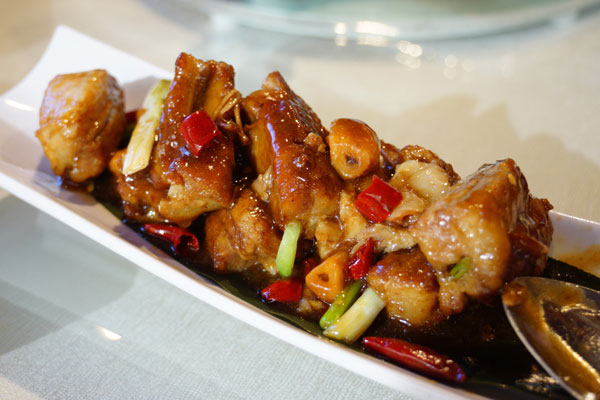
Every dish has a story in "Confucius cuisine", an ongoing food promotion at The Oriental Chinese Restaurant in Traders Hotel, Beijing.
A team of four chefs from Shandong province's Qufu, Confucius' hometown, have come to the capital to present foods prepared in the Confucius family style through Dec 22.
Six cold appetizers - including beef, jellyfish and spiced duck tongue - are named after the "six arts", such as rites, music and archery, that Confucius (551-479 BC) taught to his students.
 |
|
Braised pork ribs with shallots is a typical dish of Confucius cuisine. Ye Jun / China Daily |
A deep-fried sea bass with crispy scales is named "the kylin imperial book" because of the shape of the fish with curled-up scale. It is said that the kylin, an auspicious mythical animal in Chinese culture with curled scales, appeared to the family of Confucius before he was born.
Crispy prawn rolls with vermicelli symbolize a story of Confucius' descendants: During a period of imperial book-burning, Confucius' ninth-generation grandson Kong Fu hid books in his wall, so that they could be handed down.
Had Confucius himself ever tasted or prepared these dishes? No. Confucius, who lived in the late Spring and Autumn Period (770-476 BC), spent his life preaching his theories on how to manage a country and society peacefully. He lived a thrifty life. But his descendants were treated well by Chinese emperors. They were given land and property, and their personal chef prepared the best food of the time.
Chefs from Shandong became the first to come to Beijing to serve Chinese emperors. Therefore North China's food is deeply influenced by Shandong cuisine.
"The Confucius family had people coming from South China working for them. So the cuisine is a mixture of Shandong and South China," says Wen Shide, sous chef of Shang Palace Chinese restaurant at Shangri-La Hotel Qufu.
Shallots are fried to give flavor to dishes, Shandong style. The use of cinnamon, aniseed and cassia bark in meat braising is also widespread in China. "Shandong style uses a lot of soy sauce to give flavor, and dishes are boiled for a rather long time," Wen says. "So dishes often look dark with soy sauce, and taste flavorful with soft textures."
Typical Shandong cold appetizers on the special menu include Shandong's braised beef with tendons. "Four big bowls" features yellow wine-braised fish, a popular Shandong specialty. "Farm harvest" comes with Shandong's corn pancakes, to wrap spring onions dipped in soy sauce, along with three side dishes.
For main courses, there are soft-braised pork ribs stuffed with shallots, deep-fried sea bass, and fried Chinese yam. Shandong is a coastal region, so seafood is a favorite specialty. The special menu at Traders offers a braised eight "treasures" that include pork tendon, sea cucumber, scallop and fish maw.
Wen is from Guangdong province and has training in Cantonese cuisine, but he has worked in five-star hotels in Shandong for more than 10 years. He has adopted countryside-style presentations, but the ingredients within are prepared in refined ways.
It took the chefs and the restaurant staff quite some time to look through ancient literature and link signature dishes with historical stories. Wen says he has traveled to Thailand and many cities in China, including Taipei and Hong Kong, to cook Confucius cuisine.
IF YOU GO
The Oriental Chinese Restaurant
Confucius cuisine through Dec 22. Traders Hotel Beijing, 1 Jianguomenwai Dajie (Street), Chaoyang district, Beijing. 010-6505-2277 Ext 34.
Average spending: 150 yuan ($25) per head.
Recommended: Kong Family "Three-Ingredients Soup", Braised Pork Ribs Stuffed with Spring Onion, Crispy Prawn Rolls with Vermicelli.